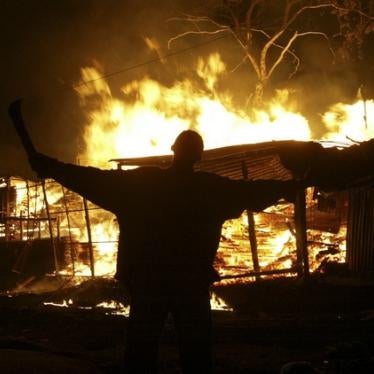Speaking for the first time, perpetrators of armed attacks in the run-up to the last general election in Kenya have said that they were backed by ruling party officials, Human Rights Watch revealed in a report released today.
The 119-page report, entitled Playing with Fire: Weapons Proliferation, Political Violence, and Human Rights in Kenya, documents the dangerous nexus between arms availability and ethnic attacks in Kenya. The report highlights politically instigated armed violence on Kenya's coast during the last general election cycle, in 1997. It calls for decisive action to prevent any such violence as Kenya prepares for general elections later this year.
"The spread of small arms and the manipulation of ethnic tensions are an explosive mix," said Lisa Misol, researcher with the Arms Division of Human Rights Watch and author of the report. "Kenya must stop weapons from getting into the hands of people who would use them to disrupt the vote."
For years Kenya has been a conduit for arms shipments destined to nearby areas of violent conflict. More recently the flood of weapons has spilled back into Kenya itself, making the resort to violence more likely-and more deadly.
Since the end of one-party rule in Kenya, election years have been routinely characterized by political violence. Politicians who have been implicated in past incidents of political violence have not been held to account.
Human Rights Watch describes in detail the armed political violence in Kenya's Coast Province in mid-1997 and the role of ruling-party officials in stoking the violence. A quasi-military force of well-organized and well-armed attackers carried out brutal attacks on civilians from other ethnic groups in areas around Mombasa, Coast Province.
In interviews with Human Rights Watch, several individuals involved in the attacks acknowledged their direct participation in the violence and described how it was organized. Their first-hand accounts and other evidence indicate that local ruling party politicians-with support from some national politicians-were instrumental in organizing, supporting, and sustaining the violence in order to displace ethnic communities viewed as likely opposition voters in general elections that were held at the end of 1997. More than a hundred people were killed and some 100,000 people were displaced, bringing to 400,000 the number displaced as a result of political violence since 1992.
A government commission of inquiry was appointed in 1998 to look into ethnic violence in Kenya since 1991. After months of hearing testimony, the commission submitted a report to President Daniel arap Moi in August 1999, but the government has refused to make it public.
"Kenya and the international community must act, and act soon, to curb the spread of these weapons and bring to justice the people who orchestrate violence for political gain," said Misol.
Human Rights Watch called on the government of Kenya to take action to prevent politically motivated ethnic violence and end impunity for past incidents of violence; ensure accountability of local security structures; and strengthen legal controls, particularly those related to the manufacture, possession, and transfer of firearms and ammunition.







